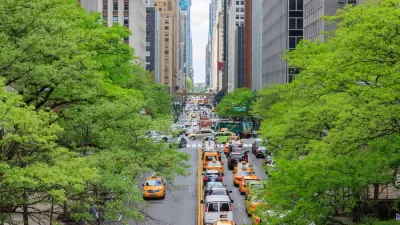A debate over a special property tax assessment to fund a James Corner-designed redo of Nicollet Mall in Minneapolis raises questions about public benefit and value capture.
A plan to renovate the Nicollet Mall in Minneapolis relies on a special property tax assessment district to fund the $50 million in design and construction work dedicated to the project. As Peter Callaghan reports, opposition to the property tax has relied on predictable rhetoric—until now. According to Callaghan, the "a batch of nonprofit organizations" are arguing that the property tax could violate the Minnesota Constitution when applied to nonprofits.
How’s that? Under Minnesota's 1858 constitution, most nonprofits are exempt from paying regular property taxes because they are presumed to deliver services that benefit the community. But under long-established case law, they do pay special assessments for things such as new streets, sidewalks or sewers adjacent to their property.
What’s happening with Nicollet Mall, however, goes beyond sidewalk and lighting, argued Kurt Glaser, an attorney representing the Basilica of St. Mary.
Callaghan reports that the basilica is pitching a new structure for the property tax, whereby nonprofits would be charged at 50 percent the rate applied to "institutions."
The article goes on to define the idea of "value capture" as enacted by the property tax assessment as well as the legal ramifications of this "creative and novel" dissenting approach to the tax. Moreover, this particular example provides a "creative and novel" pressure on the traditional tension between governments and tax-exempt entities.
FULL STORY: Why some big nonprofits are balking at how the Nicollet Mall remake is being paid for

Planetizen Federal Action Tracker
A weekly monitor of how Trump’s orders and actions are impacting planners and planning in America.

San Francisco's School District Spent $105M To Build Affordable Housing for Teachers — And That's Just the Beginning
SFUSD joins a growing list of school districts using their land holdings to address housing affordability challenges faced by their own employees.

The Tiny, Adorable $7,000 Car Turning Japan Onto EVs
The single seat Mibot charges from a regular plug as quickly as an iPad, and is about half the price of an average EV.

Seattle's Plan for Adopting Driverless Cars
Equity, safety, accessibility and affordability are front of mind as the city prepares for robotaxis and other autonomous vehicles.

As Trump Phases Out FEMA, Is It Time to Flee the Floodplains?
With less federal funding available for disaster relief efforts, the need to relocate at-risk communities is more urgent than ever.

With Protected Lanes, 460% More People Commute by Bike
For those needing more ammo, more data proving what we already knew is here.
Urban Design for Planners 1: Software Tools
This six-course series explores essential urban design concepts using open source software and equips planners with the tools they need to participate fully in the urban design process.
Planning for Universal Design
Learn the tools for implementing Universal Design in planning regulations.
Smith Gee Studio
City of Charlotte
City of Camden Redevelopment Agency
City of Astoria
Transportation Research & Education Center (TREC) at Portland State University
US High Speed Rail Association
City of Camden Redevelopment Agency
Municipality of Princeton (NJ)




























